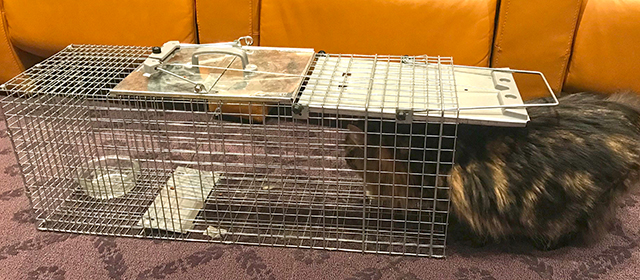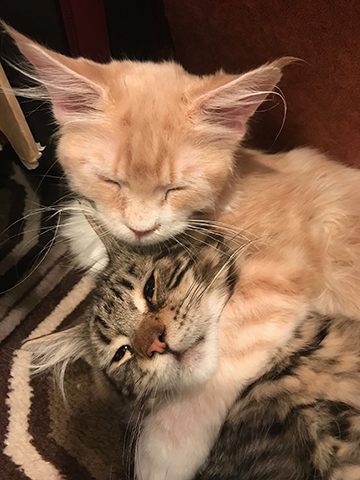

Cats that escape your house are often spooked and disoriented to the point that they will not come to you even though you are their owner. It is often difficult to get your cat back into your house. This was the case with my male Maine coon, Nikki. On November 2, 2019, while my son was bring firewood into the house, Nikki stealthily sneaked out through the opened sliding glass door. My son didn’t even know he was gone until later that evening. Four and half days later and after many neighborhood searches and distribution of missing cat fliers, Nikki returned on his own. I am impressed by the fact that he was spotted a mile and a half away from our house. Nikki was never out side on his own but his GPS system steered him back to home base. On the afternoon of Wednesday, November 6, Nikki showed up on our back porch. The problem was that when the sliding glass door was opened to allow him to reenter he darted away. I even sat vigilantly for three hours that night with the door slightly ajar hoping that Nikki would return and come in on his own but he never showed up that night.
The day before Nikki returned my son had conversations with several cat owners who suggested using a trap. After several calls, Ace hardware in our neighborhood had one in stock (photo attached). I set the trap with one of Nikki’s blankets and a bowl of food. When I came down on Thursday morning and checked the trap, I was elated to see Nikki was inside. I felt ten years younger. My biggest fear was that he would be run over by a car. Life does have some happy endings and this one is certainly on the top of my list.
Tips for Healthy Felines

Best Friends
Coconut Oil
Add a small portion of coconut oil into the kitty’s food. Start with an 1/8 tsp. and gradually increase to a 1/2 tsp. Coconut oil helps create shinier fur and helps prevent fur balls from clogging up kitty’s intestines.
Warning: Many commercially-available hairball remedies contain petroleum products—can you spell t‑o‑x‑i‑c ?
Dr. Gerald H. Smith
Oral squamous cell carcinoma in cats and the use of flea control products.
In a study by epidemiology researchers at University of Massachusetts, Amherst, flea control product use and canned food intake were significantly associated with risk of oral squamous cell carcinoma in cats (Bertone 2003). Further, the same group of researchers noted that household tobacco smoke increased the risk of both oral carcinoma and malignant lymphoma (Bertone 2002, 2003). In addition to concern for cancer risk, acute toxicosis in cats from flee control products has also been reported (Linnett 2008); and anti-flea products used regularly on cat’s bed or bedding have been linked to a high risk for hyperthyroidism (Olczak 2005).

